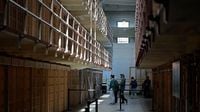On Sunday evening, May 4, 2025, President Donald Trump announced his intention to reopen Alcatraz prison, a notorious facility located on an island in San Francisco Bay that has been closed for over 60 years. In a post on his Truth Social platform, Trump stated that he is directing the Bureau of Prisons, along with the Department of Justice, FBI, and Homeland Security, to reopen a "substantially enlarged and rebuilt ALCATRAZ" to house America’s "most ruthless and violent offenders." This directive marks a significant move in Trump's efforts to reshape the federal prison system and address what he describes as a public safety crisis.
Trump's proposal comes amid ongoing frustrations with what he terms "radicalized judges" who advocate for due process rights for those facing deportation. He expressed his belief that, "When we were a more serious Nation, in times past, we did not hesitate to lock up the most dangerous criminals, and keep them far away from anyone they could harm. That’s the way it’s supposed to be." This rhetoric reflects a broader narrative within Trump's administration focused on strict law enforcement and a crackdown on crime, particularly involving immigrants.
Alcatraz, famously known as "The Rock," was operational from 1934 until its closure in 1963 due to crumbling infrastructure and high operational costs. It was notorious for housing some of the country’s most infamous criminals, including gangster Al Capone and George “Machine Gun” Kelly. The prison has a storied history of escape attempts, with 36 men trying to escape in 14 separate incidents during its operation. However, no successful escapes were ever officially recorded, though five inmates are listed as "missing and presumed drowned." This reputation for being inescapable was bolstered by the prison's isolated location, surrounded by cold, turbulent waters.
Despite its historical significance, the feasibility of reopening Alcatraz as a functioning prison has been met with skepticism. The facility was costly to operate, being nearly three times more expensive than other federal prisons, primarily due to the logistical challenges of supplying the island. Everything from food to fuel had to be transported by boat, making it an impractical choice for modern incarceration needs. Critics, including former House Speaker Nancy Pelosi, have pointed out that the island is now a popular tourist destination and a designated National Historic Landmark, stating, "It is now a very popular national park and major tourist attraction. The President’s proposal is not a serious one."
The Bureau of Prisons has indicated that it will comply with the President’s orders, but details regarding the practicalities of such a project remain unclear. Reopening Alcatraz would likely require significant investments to bring the facility up to current standards, a daunting task considering the agency has been closing other prisons due to similar infrastructure issues. The agency is currently in a state of flux, with a new director and a redefined mission that includes accommodating thousands of immigration detainees under an agreement with the Department of Homeland Security.
This announcement also comes against the backdrop of Trump's administration's ongoing legal battles and controversial proposals regarding the treatment of criminal offenders. Trump has previously suggested sending U.S. citizens convicted of violent crimes to a maximum-security prison in El Salvador, known as CECOT, and has directed the opening of a detention center at Guantanamo Bay, Cuba, to hold what he labels as the "worst criminal aliens." These measures have raised alarms among legal experts and civil rights advocates, who argue they infringe upon due process rights.
In recent years, the Bureau of Prisons has faced increased scrutiny following high-profile incidents, including the suicide of Jeffrey Epstein in a federal facility in 2019. An investigation by the Associated Press uncovered numerous flaws within the Bureau, including chronic violence, staffing shortages, and allegations of sexual abuse at some facilities. In response to these revelations, President Joe Biden signed legislation in 2024 to strengthen oversight of the agency.
As Trump continues to push his agenda of law and order, the proposal to reopen Alcatraz serves as a symbolic gesture aimed at reinforcing his stance on crime and punishment. However, the practicality of such a venture raises numerous questions about the future of federal incarceration and the broader implications for the justice system. The ongoing dialogue around Alcatraz reflects a complex interplay of public safety concerns, historical legacy, and the evolving landscape of American corrections.
While the idea of reopening Alcatraz may resonate with some segments of the population as a tough-on-crime measure, the reality of its implementation is fraught with challenges. With the prison's storied past and its transformation into a tourist attraction, any attempt to repurpose it for modern use will require careful consideration of both logistical and ethical dimensions. As Trump’s administration navigates these waters, the fate of Alcatraz remains a topic of heated debate.
In summary, the proposal to reopen Alcatraz prison encapsulates the tensions between historical significance and contemporary corrections policy, raising critical questions about the future of America's criminal justice system. As discussions unfold, the implications of such a move will undoubtedly continue to spark debate among lawmakers, legal experts, and the public at large.





